Given the high degree of competition present in this profession, your electrician resume needs to showcase not just your credentials, but also your accomplishments and experience.
Learn how to present your mastery of the trade by following our comprehensive guide. Inside, you'll find plenty of practical examples, electrician resume samples, and templates you can adjust to your liking.
In this article, we teach you how to:
- Choose the right resume format according to your electrician certification level
- Optimize your resume summary to display your expertise
- Showcase not just job responsibilities but also accomplishments in your work experience section
- Include the proper information on electrician training, credentials, and education
- Highlight the best skills and keywords for electricians
- Access relevant resources for job-seeking electricians
1. Choose the right format for your electrician license and level
The very first step you must take when writing your resume is determining which format will best fit your electrician license type.
As an electrician, there are 4 main types of licenses you can earn:
- Apprentice electrician: An apprentice electrician will still be in the training phase of their career, though they will participate in jobs and on-site training. Becoming an apprentice electrician does not require past experience, but will require you to hold this position for upwards of 2 to 3 years.
- Journeyman electrician: The journeyman electrician license is earned once candidates meet the necessary training and experience requirements, as well as pass a state-mandated exam. The journeyman level is when electricians can begin working independently.
- Master electrician: Master electrician is the highest licensing level, allowing electricians to take on much more complex jobs, gain permits, and develop projects. Masters also often supervise the lower license levels.
- Specialty electrician: On top of being a journeyman or master, an electrician can also earn specialty licenses to work on more unique jobs, such as HVAC systems or pools.
Your ideal resume format may differ depending on which license you currently hold. With this in mind, let’s look at the two main types of resumes, reverse-chronological and functional, and assess which will suit your needs.
A reverse-chronological resume emphasizes work experience, listing the most recent job first and working backward from there. Comparatively, a functional resume takes the focus off work experience and places it instead on other sections, such as skills or education.
When it comes to resumes for electricians, a combination of both of these resume formats is typically in order. This is largely due to the fact that education and training overlap with work experience for electricians.
For apprentices and journeymen, a combined resume format will still showcase their work experience but will add extra emphasis on the education components. However, once journeymen become more experienced, they may prefer to use a more traditional reverse-chronological format.
For masters, the reverse-chronological format is the best option, as they will have an abundance of experience to show off.
2. Optimize your resume summary to display your expertise
Whenever you create a resume, you should always include a resume summary or objective at the very top. This short blurb not only introduces your resume to an employer but also allows you to highlight your very best skills or accomplishments.
For electricians, the summary is the best place to announce your current licensing and experience level.
Incorrect electrician resume summary example
"Experienced Electrician that has been working on home wiring for many years. Responsibilities include maintenance, repairs, and supervising apprentices."
What's wrong with this example? As you write your electrician summary, you want to be as specific as possible. Include your precise license title and any specialties you may have. Additionally, job responsibilities should be moved to the work experience section.
Corrected electrician resume summary example
"Journeyman Electrician with more than 5 years experience working in residential neighborhoods and commercial buildings. Specialized in HVAC system wiring, maintenance, and repair."
Why is this better? In this corrected example, the applicant provides their license level (journeyman) as well as a quantifiable amount of years of experience. They also include their specialty area of expertise.
3. Showcase your accomplishments in your work experience section
The work experience section on your resume is more than just a place to list out your previous jobs and responsibilities. To make this section as effective and compelling as possible, you should use it to showcase your relevant accomplishments.
Here is an example of a strong work experience entry for a master electrician
Master Electrician
Georgia Power | August 2015 – Present | Atlanta, GA
- Supervised and mentored a team of 4 Apprentices, helping each to advance to the Journeyman license.
- Developed strong customer relationships that led to a company rating improvement from 3.5 stars to 4.8 stars out of 5.
- Installed, maintained, and repaired commercial building wiring, electrical panels, and mechanical schematics.
4. Include the proper electrician credentials and education
As previously mentioned, an electrician’s education and training will often overlap with their work experience. Depending on how much experience you have as an electrician, you may want to separate your initial apprenticeship off into its own education section.
Additionally, you should create a small section for licenses and certifications. This section should include each of your licenses, as well as when and where they were earned.
Electricians will also often have additional certifications to promote the health and safety of their crew, such as First Aid or CPR certifications. These extra certs should always be included, as they give you a greater competitive edge as a candidate and show your commitment to team safety.
5. Highlight both technical and interpersonal skills
Being an electrician is a highly technical profession. As such, it can be tempting to only include technical skills (hard skills) on your resume.
However, there are many interpersonal skills (soft skills) involved in electric work as well. From working with a team to communicating with customers, your electrician resume should also highlight your ability to work well with other people.
Best hard skills to include on your electrician resume
- Knowledge of National Electric Code (NEC)
- Installing and Maintaining Electrical Systems
- Wiring system repair
- Quality Assurance
- Programmable Logic Controllers (PLC)
- Blueprint and Schematic Analysis
- Commercial Buildings
- Residential Electric
- Apprentice Mentor
- Equipment Testing
Best soft skills to put on your electrician resume
- Customer Service
- Collaboration
- Team Leadership
- Problem Solving
- Communication
- Adaptability
- Reliability
- Independence
- Delegation
- Detail-Oriented
6. Top resources for job-seeking electricians
Now that your doubts about crafting a standout electrician resume have been dispelled, let's talk about another potential hurdle standing in your way — job hunting. To some, navigating the sea of opportunities comes easy, but that's not the case for everybody. If you need a bit of assistance with your job searching, feel free to make use of the following resources:
- Industry-specific job boards: The first places you want to explore are websites like ElectricianJobs.com, Construction Jobs, or iHireConstruction. Since these specialize in gathering job postings pertaining to your profession only, finding suitable opportunities won't be difficult.
- General job search websites: But don't discount platforms like Indeed, Glassdoor, LinkedIn, ZipRecruiter, or SimplyHired just yet. Although you'll have to do a bit of sifting here, your efforts won't be fruitless.
- Professional associations: Or, you can just visit official pages of organizations like the National Electrical Contractors Association (NECA), the Electrical Contractors Association (ECA), or the Institute of Electrical and Electronics Engineers (IEEE). These can give you access to job listings, networking opportunities, further training, and so much more.
- Specialized publications: Don't underestimate the importance of keeping yourself updated on the latest industry insights! Media like “Electrical Contractor Magazine,” “EC&M Magazine,” or “Electrical Line Magazine” are perfect for this.
- Continuing education: To further enhance your employability, consider enrolling in continuing education courses or workshops offered by organizations like the National Joint Apprenticeship and Training Committee (NJATC) or trade schools to stay updated on industry regulations, technologies, and best practices.
- Trade shows and conventions: Also, it's always a good idea to attend trade shows, conferences, and conventions such as the National Electrical Contractors Association (NECA) Convention or the International Construction & Utility Equipment Exposition (ICUEE) to network with industry professionals, learn about new products and technologies, and explore job opportunities.
What more to add? Perhaps just a reminder that job hunting can be tough sometimes. But with a dose of persistence and dedication, you'll find exactly what you're looking for. Good luck!
Electrician Resume FAQ
Should I tailor my electrician resume to each job application?
Absolutely! This is the alpha and omega of writing a job-winning resume! Always highlighting the most relevant skills, experiences, and achievements that align with the specific requirements of the position as outlined in the job posting you're currently responding to. After all, each and every job opportunity is unique, and your resume should reflect that.
How far back should I go when listing work experience on my electrician resume?
Generally, you should include only the most recent 10-15 years of relevant work experience on your resume. Considering the fast-changing nature of your profession, anything older than that might no longer be relevant.
How can I quantify my achievements on my electrician resume?
Whenever possible, quantify your achievements by including numbers, percentages, or dollar amounts to provide context and demonstrate the impact of your contributions more vividly. For example, you might mention that you completed a certain number of installations or repairs within a specific timeframe, or that you contributed to reducing downtime or improving efficiency.
How can I effectively use keywords in my electrician resume?
Firstly, you need to review your job posting carefully and identify keywords and phrases describing the employer’s expectations of their ideal candidate, such as "electrical code compliance," "blueprint reading," or "troubleshooting techniques." Then, incorporate these keywords naturally throughout your resume, especially in the skills section and work experience bullet points. By doing so you'll ensure that your resume is ATS-friendly.
What are common mistakes to avoid when writing an electrician resume?
Some of the most common mistakes include: including irrelevant or outdated information; NOT tailoring your resume to each job application; making spelling or grammatical errors. But there's an easy fix! Careful proofreading should catch all such errors.

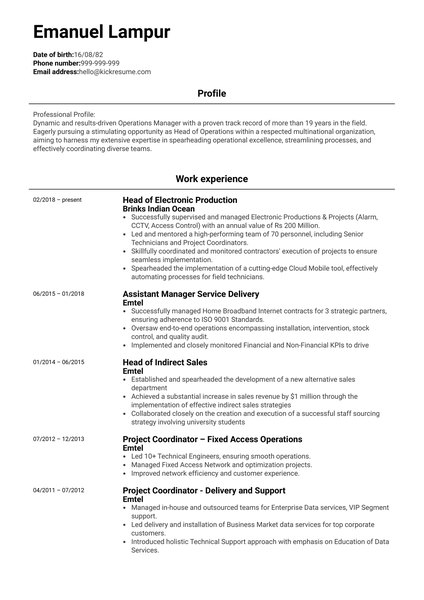
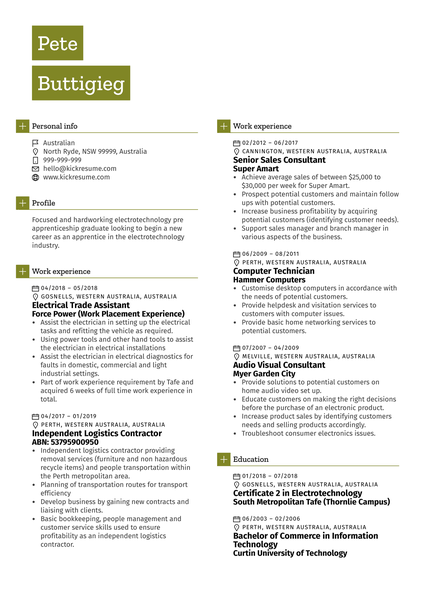



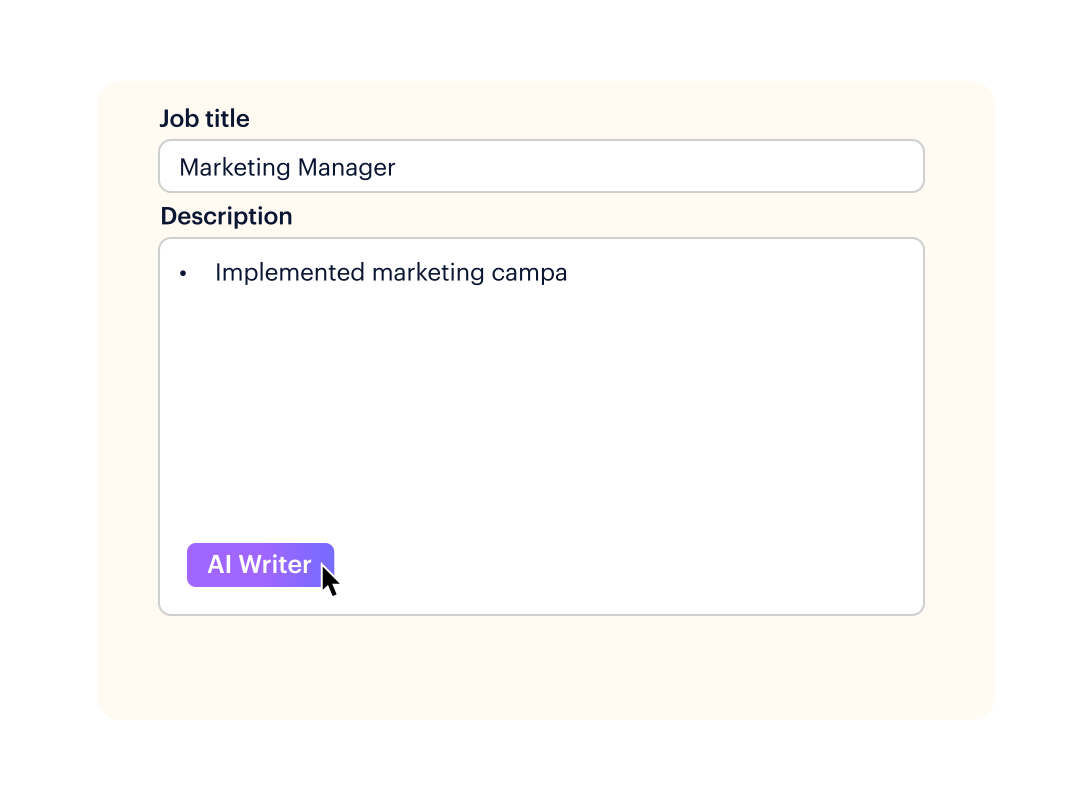

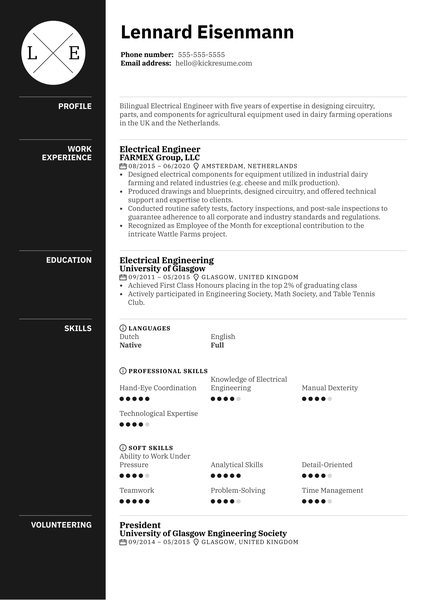
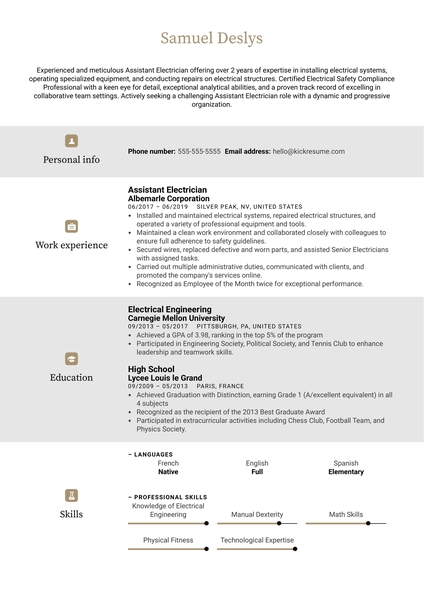

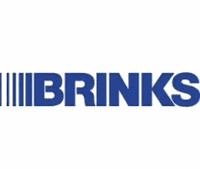
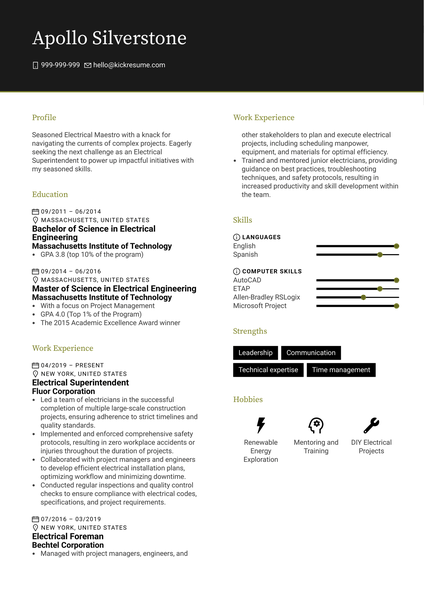

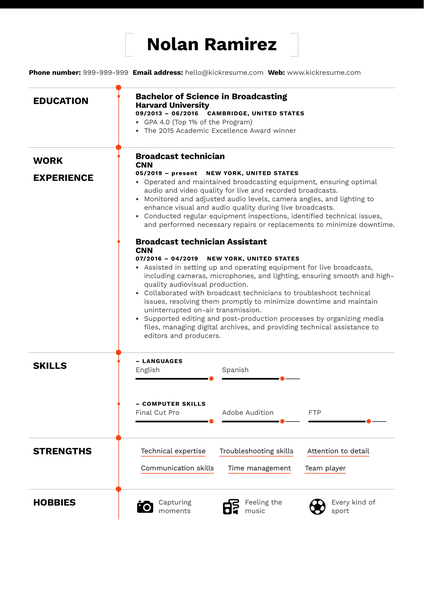
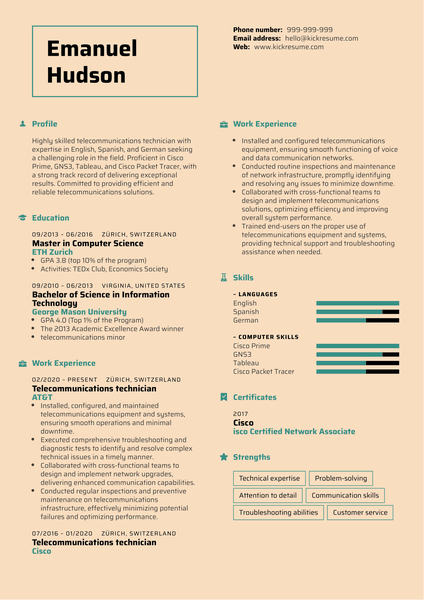
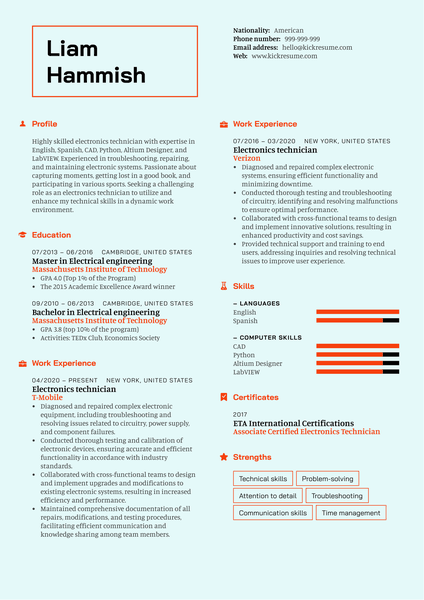
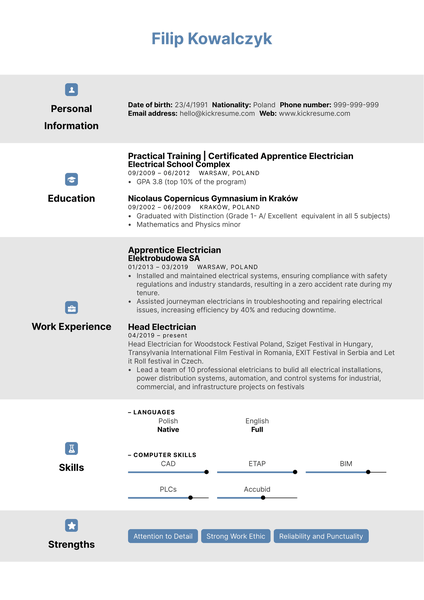
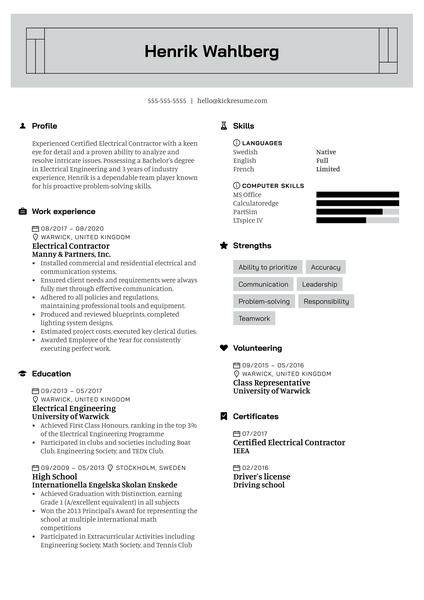

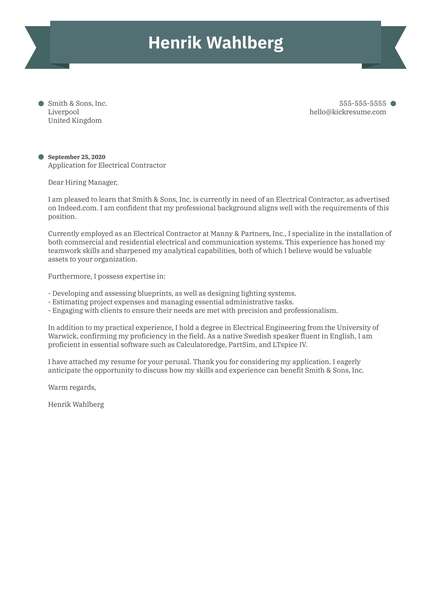


![How to Write a Professional Resume Summary? [+Examples]](https://d2xe0iugdha6pz.cloudfront.net/article-small-images/i-Profile.svg)
![How to Put Your Education on a Resume? [+Examples]](https://d2xe0iugdha6pz.cloudfront.net/article-small-images/i-Collage-Universities.svg)
![How to Describe Your Work Experience on a Resume? [+Examples]](https://d2xe0iugdha6pz.cloudfront.net/article-small-images/Experience.svg)


